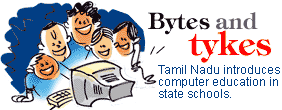

|
|
|
|
| HOME | INFOTECH | HEADLINES | |||
|
November 22, 1999
HEADLINES
|

Shobha Warrier in Madras While other states are encouraging entrepreneurs already established in the infotech sector, Tamil Nadu is going a step further.
A high level committee headed by Prof Ananthakrishnana along with Prof Muthukrishnan, Deputy-Director of the IIT Madras drafted the syllabus that includes Introduction to Computers, Introduction to Windows, Basic DOS commands, Word Processing, spread sheets, Data Bases, Computer Communication and Internet, Programming in C, Visual Basic, Introduction to HTML and HTML concepts. Out of 1,250 government schools in the state, 666 were selected for the first phase of implementation. These include 146 schools in the Madras region (which include places like Madras, Kanchipurma, Thiruvallur, Vellore, Thiruvannamali, Cuddalore and Villupuram), 232 schools in the Coimbatore region (which include Coimbatore, Erode, Salem, Dharmapuri and Nilgiris), 155 schools in the Madurai region (which include Madurai, Theni, Virudhunagar, Sivaganga, Dindigul, Ramanathapuram, Tutocorin, Tirunelveli and Kanyakumari) and 133 in the Trichy region (that include Trichy, Perambalur, Karur, Pudukottai, Thanjavur, Tiruvarur, Nagapattinam and Namakkal. Of these 666 schools, 126 are girls' schools and 343 are rural schools. The government also plans to introduce computers as a subject in the ninth and 10th standards and then work down to the students of sixth, seventh and eighth standards. Involvement of the private sector in social infrastructure: As the first step, ELCOT was made the procurement and implementing agency for the TN government. The plan envisaged providing 10 computers to every class of 40 in every government school. ELCOT selected 43 computer education firms, choosing them on the basis of their experience in computer education, the number of centres they had in Tamil Nadu and whether they had established themselves in the business for the last three years. NIIT alone is going to provide computer education to 370 schools in the state and Aptech, to 20 schools. Other than some of ELCOT's joint ventures, like Ravichandra Systems (70 schools), Intron Electronics (10 schools), the Bombay-based Miacet (60schools), a number of local computer firms have also been involved in this effort. The five-year contract offered by the state is a leasing-cum-service contract in which the contractor has to provide the hardware, software as well as instructors in all schools. In each school, the firm has to provide one PC server, nine PCs, a modem, a UPS, a printer, a two-tonne air-conditioner, furniture, cabling, etc. The government will make quarterly payments to computer education firms through ELCOT. This will amount to Rs 1,712, 000 in five years. The firm will get 120th of Rs 1.7 million, but only after ELCOT gets a certificate of satisfaction from the headmaster or headmistress of the school. Inaugurating the computer education centers, Vice-President Krishna Kant stressed the need for a dependable infrastructure like power supply and communication. K Gnanadesikan, chairman and MD of ELCOT said Tamil Nadu was one of the better electrified states of the country. "The fact that we are able to provide three-phase power connections to computer labs in all the 666 schools without a hitch shows that we have the infrastructure," he said. The machines now use Pentium II chips, with upgradation planned in the next five years. And maintenance? "The equipment is owned by the computer firm. I am only the lessee. So, he is bound to maintain his equipment well. If the computers are not maintained, he will not get his payment. So, it is in their self-interest that they maintain the computers. "It is also the duty of the computer firm to ensure that at least 60 per cent of the students pass the 12th computer science examination. The firms have to pay a penalty if they do not meet all these standards," he said. The computer firms are allowed to use the school premises to teach the general people after school hours and during the vacations. So, they stand to earn more than just the quarterly payments the government provides. "I feel it is a win-win situation for all. Let us take NIIT. It has 80 centers in the state. Today in one shot, they have expanded their network by 370 centers," says Gnanadesikan. For the 30,000 students who pass out from the schools, there are already 16,000 IT-related courses in the 121 engineering colleges of the state that makes Tamil Nadu the largest producer of engineers. The HRD ministry and the Andhra Pradesh government have apparently sought blueprints of the computer education program. Murasoli Maran in his speech on the inauguration day had also noted that a study report by the Harvard Institute of Development Studies pointed out that Tamil Nadu has now emerged as a force to reckon with in information technology in Asia. If everything goes well, Karunanidhi's dream of having monitors replace blackboards will take place soon. |
||||||
|
HOME |
NEWS |
BUSINESS |
SPORTS |
MOVIES |
CHAT |
INFOTECH |
TRAVEL |
SINGLES BOOK SHOP | MUSIC SHOP | GIFT SHOP | HOTEL RESERVATIONS | MONEY EDUCATION | PERSONAL HOMEPAGES | FREE EMAIL | FEEDBACK |